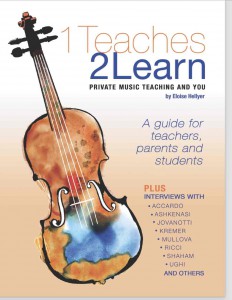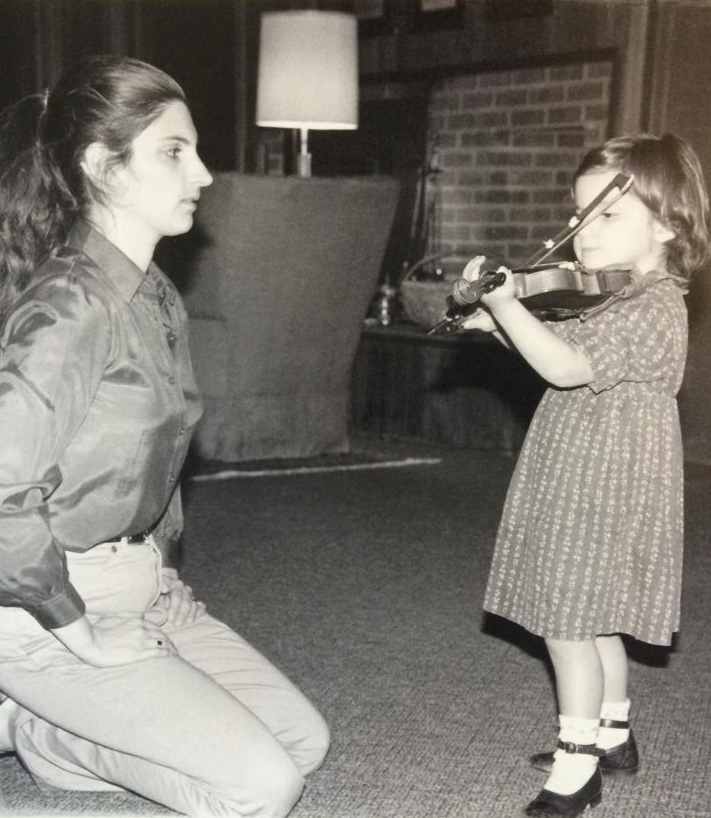Too Many Words
Not too many notes – too many words! I bet you thought I was going to talk about teachers talking too much. Nope, In my opinion, we don’t talk enough to our students. But that’s an issue for another post. Here, I want to discuss the problem of parent prolixity: how it affects the learning process and what we teachers can do to help the well-meaning parents afflicted with it.
Modern parents often can’t spend as much time with their children as they would like. Therefore, finding time for leisurely practice sessions or waiting until their children are in the mood to practice is a real problem. Thinking to save time, parents sometimes try to get children to take responsibility for things they are not ready to be responsible for. Putting on their music CD, taking out their violins either at home or at the lesson, remembering to practice on their own are a few examples of simple things that prompt rivers of parental run-on sentences and useless threats. Worry about the teacher’s opinion of their parenting skills when their progeny behaves less than perfectly (in their eyes) during a lesson brings forth even more verbiage. On top of that, some parents are prone immediately to repeat whatever instruction the teacher has just given to the student to make double sure he has heard it. Parents who spend so much time, energy and words in this way have the best intentions in the world. Raising responsible children is an admirable goal, but a constant flow of words to get their children to achieve what they are not yet capable of achieving often has an unexpected and undesired side effect:
Children stop listening to their parents.
What to do? First of all, I ask my students’ parents not to help me. Even if a really wriggly little boy (sorry, they’re the worst) doesn’t seem to be listening to me, the truth is often that he really has heard all I’ve been saying to him – he just has trouble controlling his physical energy. I also have ways of determining whether or not he has heard me and can fix this on my own. If I need help, I will ask for it. I may ask the mother of a fidgety child who wanders off while I’m teaching him, to quietly bring the child back to me – no bawling out. I make parents understand very quickly that I’m on THEIR side and that I know how difficult raising children is, not to mention getting them to practice. The visible relief on many parents’ faces when they realize I don’t judge them is proof enough that I’m on track. “Besides,” I tell them, “you wouldn’t be here if you weren’t trying hard to be a good parent – something no one really knows how to do.” Babies don’t come with an instruction manual like a new washing machine.
Then I tell them that years ago when my daughters were very young, an older friend with teenage children told me something that was enormously helpful to me: “We talk too much to our children.” You may think that is a ridiculous thing to say, but I quickly found out what she meant; in a running stream of words, we may attempt to give our children too much responsibility by trying to get them to do things they are not ready to do for themselves and that we could easily do for them. When children are not capable of taking on the responsibility we are trying to manipulate them into taking, they feel bad about it and, worst of all, they stop listening to us.
The standing rule, one that I encourage parents to adopt is as follows: whatever is easy to do for the child that he can’t or won’t do on his own, do it yourself as silently as possible – it’s easier. Let him do what only he can do. Below is an example of a list of what parents can do for a child to avoid argument and conserve their energy:
- Get her violin out for her.
- Find her music.
- Rosin her bow.
- Put on her CD for her as often as possible.
- Use whatever strategy possible to get the child to practice (in accord with the teacher) without making her feel guilty if she is not capable of doing it on her own.
- Don’t talk to the child during the lesson, but please do talk to the teacher.
Here’s what you, the teacher, can do to help the parent:
Encourage parents to to do what’s on the above list with a minimum of words and above all, no reproving the child for not doing these things on her own. This way parents save their energy for the more important issues, like practicing and reminding the child of the teacher’s instructions. Also, encourage parents to remember that when their children are bigger, they will naturally assume certain responsibilities with minimal prompting and that they won’t take their pacifiers or diapers with them to college, either! Just to put things in perspective.
We can also invite parents to notice that when we are teaching their small children, we put our own advice into action with the famous “one point lesson.” Of course, this ideal can be quite difficult to achieve but I point out to parents that when I’m talking to a child about holding up his violin, for example, I don’t fuss at him about his bow hold – I just fix it myself. Too many words on too many subjects are overwhelming to children (or really to anyone), they can’t process it all and – voilà! – they tune out.
Parental authority is important in the lives of children, so parents must take care not to dissipate this authority and make it lose its value and power with constant reprimands, implorations and attempts to give their children responsibility beyond their maturity levels. I have always liked Teddy Roosevelt’s slogan, “Speak softly” (okay, not always) “and carry a big stick.” The big stick parents carry is composed of words. Encourage parents is to use them carefully and make them count.
Post Author: Eloise Hellyer
Share this:
Buy it on www.sharmusic.com - eBook format, avaliable worldwide, paperback in North America
COPYRIGHT
ABOUT
A music teacher’s thoughts and observations on the teaching and the study of a musical instrument, hoping to be of help to parents, students and teachers.
PHOTO
AWARDED TOP 25 VIOLIN BLOG
CATEGORIES
TAGS
ARCHIVES
-
Agosto 2022
Agosto 2023
Agosto 2024
April 2015
April 2016
April 2017
April 2019
April 2020
Aprile 2022
Aprile 2023
Aprile 2024
August 2014
August 2015
August 2016
August 2017
August 2018
August 2019
August 2021
December 2014
December 2015
December 2016
December 2017
December 2018
December 2019
December 2020
Dicembre 2022
Dicembre 2023
Dicembre 2024
Febbraio 2022
Febbraio 2023
Febbraio 2024
February 2015
February 2016
February 2018
February 2019
February 2020
February 2021
Gennaio 2022
Gennaio 2023
Gennaio 2024
Giugno 2022
Giugno 2022
Giugno 2023
Giugno 2024
January 2015
January 2016
January 2017
January 2018
January 2019
January 2020
July 2015
July 2017
July 2019
June 2016
June 2017
June 2018
June 2019
June 2020
June 2021
Luglio 2022
Luglio 2023
Luglio 2024
Maggio 2022
Maggio 2023
Maggio 2024
March 2015
March 2016
March 2017
March 2018
March 2019
March 2020
March 2021
Marzo 2022
Marzo 2023
Marzo 2024
May 2015
May 2016
May 2018
May 2019
May 2020
November 2014
November 2015
November 2016
November 2017
November 2018
November 2019
November 2021
Novembre 2022
Novembre 2023
Novembre 2024
October 2014
October 2015
October 2017
October 2018
October 2019
October 2020
October 2021
Ottobre 2022
Ottobre 2023
Ottobre 2024
September 2014
September 2015
September 2016
September 2018
September 2019
September 2020
September 2021
Settembre 2022
Settembre 2023
Settembre 2024
RECENT POSTS
Terry G and Me, or Terry Gilliam on Where (or What) Practicing the Piano Will Get You…
The Teaching We Don’t Do Is More Important Than We Think
Overwhelmingness or What Teaching and Motherhood* Have in Common
Cellphone Serenity
How to Build Your Reputation – the Kind You Want
Desperate Times, Desperate Measures. Or How to Deal With Your Strong-Willed Stubborn Student and Survive
“Why Does My Teacher Get So Frustrated?” Letter to a Perplexed Student
Mount Rush-no-more….And How to Get There
Realizzato con VelociBuilder - Another Project By: Marketing:Start! - Privacy Policy




